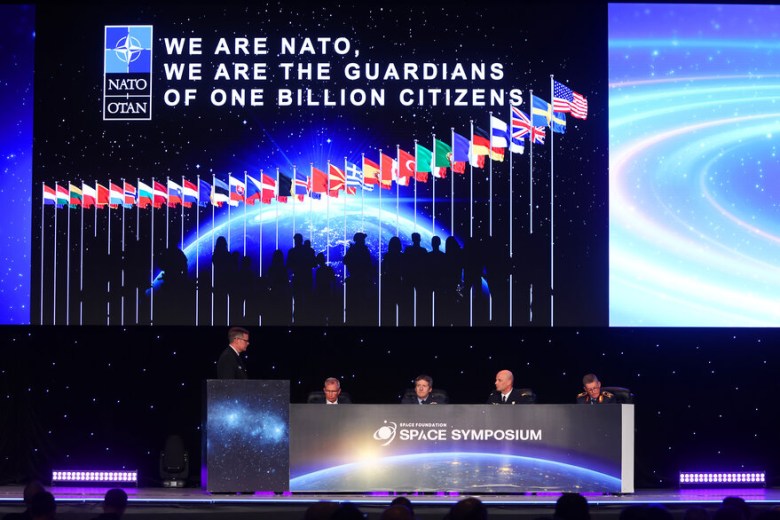COLORADO SPRINGS – The space sector is likely to benefit from increased defense spending by NATO allies, European military leaders said at the Space Symposium.
At the NATO Summit in the Netherlands June, leaders may pledge national defense spending “as high as 3.5 percent” of their gross domestic products, said Tom Goffus, NATO assistant secretary for general operations. (Since 2014, NATO allies have agreed on a 2 percent level for defense budgets.)
A 3.5 percent level would add about $400 billion a year to military budgets. And since it takes years to deliver tanks, aircraft and ships, “commercial space especially can operationalize that surge in investment at speed and at scale,” Goffus said April 8.
While the Trump Administration was never mentioned during the NATO panel, many of the comments seemed aimed at the President who has said repeatedly that NATO nations do not shoulder enough of the cost of defending the alliance.
“America first does not need to mean America alone,” Goffus said. “The combined economic might and military might of 32 allies will make NATO a major space player with significant throw rate.”
Space Cyber Salvo
NATO is rewriting defense plans based in part on the lessons of Russia’s 2022 invasion of Ukraine.
“We know the very first attack by Russia in February 2022 was a cyberattack on Ukraine’s ability to use space,” Goffus said. “We expect the first salvo of any war against a peer competitor will be a space cyber-electronic warfare cocktail, followed then by deep strikes and force-on-force.”
To prepare, NATO is surveying national space programs and recommending “effects-based space capability targets for each ally,” Goffus said.
Maj. Gen. Wolfgant Ohl, German Ministry of Defence deputy director general for military strategy and operations, said, “We have to synchronize what we are striving for in space” to ensure NATO does not end up with the space equivalent of a ship with many anchors but no weaponry.
At the same time, NATO leaders must consider options for responding to attack, said Royal Air Force Air Marshall John Stringer.
“The pace of adaptation and adoption of capabilities, and therefore the generation of options in the space domain, maybe faster than in other domains,” Stringer said. “Therefore, we have to increase our detective posture to make sure that we are leveraging that at the rate of change.”
Solidarity
In a conflict, commercial space will provide novel tools as well as redundancy for military assets. As a result, commercial spacecraft and networks will be vulnerable.
“In any types of war, you must be ready to sustain some losses and to see your capabilities attacked and degraded,” said Maj. Gen. Philippe Adam, French Space Command Commander. Military and commercial space “are facing the same risks. We are facing the same threats. And we have to fight together, of course, in solidarity.”


